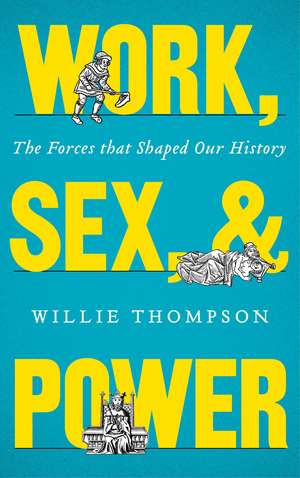Work, Sex, and Power: The Forces that Shaped Our History
Autor Willie Thompsonen Limba Engleză Hardback – 15 apr 2015
The forces that shape our history are always contentious, yet our fascination with what drives the actions of the human race is inexhaustible. In Guns, Germs, and Steel, Jared Diamond proposed one set of forces; Willie Thompson, in Work, Sex, and Power, suggests a far more radical and fundamental trio. Deploying decades of experience as a historian, Thompson re-establishes a materialist narrative of the entire span of human history, drawing on a vast range of contemporary research.
Written in a clear and compelling style, this sweeping, ambitious history is accessible to audiences who are new to Marxism. Thompson discusses and explains the foundations of social structures and themes that have recurred throughout the phases of global history in the interaction between humans and their environment. From communities of Paleolithic hunter-gatherers to the machine-civilization of recent centuries, Thompson takes us on a journey through the latest thinking in regard to long-term historical development.
Written in a clear and compelling style, this sweeping, ambitious history is accessible to audiences who are new to Marxism. Thompson discusses and explains the foundations of social structures and themes that have recurred throughout the phases of global history in the interaction between humans and their environment. From communities of Paleolithic hunter-gatherers to the machine-civilization of recent centuries, Thompson takes us on a journey through the latest thinking in regard to long-term historical development.
Preț: 584.43 lei
Preț vechi: 697.38 lei
-16% Nou
Puncte Express: 877
Preț estimativ în valută:
111.85€ • 116.34$ • 92.33£
111.85€ • 116.34$ • 92.33£
Carte indisponibilă temporar
Doresc să fiu notificat când acest titlu va fi disponibil:
Se trimite...
Preluare comenzi: 021 569.72.76
Specificații
ISBN-13: 9780745333410
ISBN-10: 0745333419
Pagini: 320
Dimensiuni: 150 x 230 x 25 mm
Greutate: 0.48 kg
Editura: PLUTO PRESS
Colecția Pluto Press
ISBN-10: 0745333419
Pagini: 320
Dimensiuni: 150 x 230 x 25 mm
Greutate: 0.48 kg
Editura: PLUTO PRESS
Colecția Pluto Press
Notă biografică
Didier Fassin is the James D. Wolfensohn Professor of Social Science at the Institute for Advanced Study, Princeton. Developing a critical and engaged approach, he has conducted extensive fieldwork in Senegal, Ecuador and South Africa in the domain of political and moral anthropology. His most recent ethnographic research concerns the French police and prison system. Didier Fassin is the James D. Wolfensohn Professor of Social Science at the Institute for Advanced Study, Princeton. Developing a critical and engaged approach, he has conducted extensive fieldwork in Senegal, Ecuador, South Africa and France in the domains of medical, political and moral anthropology. For this volume, he has collaborated with Yasmine Bouagga, Isabelle Coutant, Jean-Sébastien Eideliman, Fabrice Fernandez, Nicolas Fischer, Carolina Kobelinsky, Chowra Makaremi, Sarah Mazouz and Sebastien Roux.
Cuprins
Introduction
1 Cosmos, Creatures and Consciousness
2 Cooperation, Stone, Bone and Dispersal
3 The Neolithic Transformation: Settlement, Wealth and Social Differentiation
4 Gender Differentiation, Sex and Kindred
5 Status Differentiation, Hierarchy and Hegemony
6 Exploitation and Violence
7 Ethics, Ambitions, Crime and Punishment
8 The Origins of Belief in the Supernatural and the First Salvation Religions
9 Monotheism
10 Imagined Communities: Signs and Symbols, Identities and Nations
11 A Broad View – The Rhythm of Empire
12 Human Reality in Transformation: Modern Population, Migration and Labour
13 Inhuman Powers - Capitalism, Industry and their Consequences
14 No Such Thing as a Free Lunch: Trade-Offs, Opportunity Cost and the Dynamic of Unintended Consequences
15 Social Critique
16 Socialism: its Promise and Paradox
17 Desperately Seeking Significance
Notes
Index
1 Cosmos, Creatures and Consciousness
2 Cooperation, Stone, Bone and Dispersal
3 The Neolithic Transformation: Settlement, Wealth and Social Differentiation
4 Gender Differentiation, Sex and Kindred
5 Status Differentiation, Hierarchy and Hegemony
6 Exploitation and Violence
7 Ethics, Ambitions, Crime and Punishment
8 The Origins of Belief in the Supernatural and the First Salvation Religions
9 Monotheism
10 Imagined Communities: Signs and Symbols, Identities and Nations
11 A Broad View – The Rhythm of Empire
12 Human Reality in Transformation: Modern Population, Migration and Labour
13 Inhuman Powers - Capitalism, Industry and their Consequences
14 No Such Thing as a Free Lunch: Trade-Offs, Opportunity Cost and the Dynamic of Unintended Consequences
15 Social Critique
16 Socialism: its Promise and Paradox
17 Desperately Seeking Significance
Notes
Index
Recenzii
“An extremely ambitious attempt to explain the history of humankind. Thompson’s historical materialism provides him with a reliable compass on his journey and the end result is nothing short of inspiring.”
“Willie Thompson has written an engaging and concise world history that is both analytically ambitious and lucidly argued. It's an excellent discussion of many complex questions which should be of interest to both undergraduates and the general reader.”
“Willie Thompson reminds us all of the power of a master narrative written in the now all too rare tradition of all-encompassing erudition that impresses and inspires, informs and provokes. A powerful book derived from decades of historical research and reflection on the essence of what it is to be human. A must read.”
“The history of civilization has enjoyed a renaissance of late. Historians grapple with civilizations’ clashes, their defense and their erosion. This book is, therefore, a welcome addition to the history of change in the global human condition and situation. By tracing and analyzing human relationships within the framework of work, sex and power, civilization’s ‘fabric of history’ unfolds to illustrate clearly the rise and fall of different forms of social, political and economic organization.”
